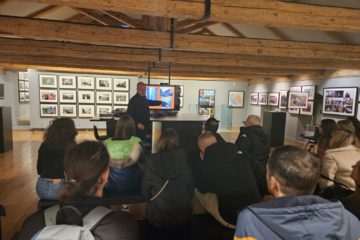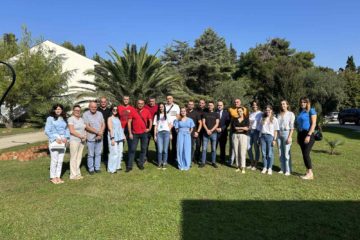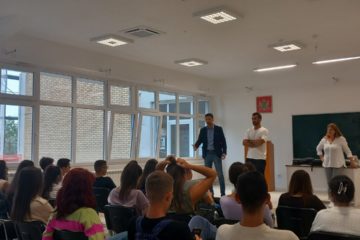The Youth Initiative for Human Rights has organized meetings over the past two months, bringing together representatives from religious communities, the LGBTIQ+ community, and NGOs involved in the protection and promotion of human rights. Representatives from the Ministry of Human and Minority Rights also attended the meetings as supporters of the project “Human Rights Know No Sexual Orientation – Discrimination Holds the Same Meaning for all.”
The aim of the meetings was to exchange views and opinions on the challenges faced by LGBT individuals, as well as to openly discuss the positions of religious communities towards them, based on the understanding that discrimination in any form is undesirable. The meetings were moderated by psychologist and psychotherapist Al-Ammar Kašić, whose purpose was to ensure that the voices and perspectives of all participants were heard and understood, fostering dialogue in an atmosphere of acceptance and understanding.
The meetings were organized in three segments. Initially, contact was established with the participants, followed by three rounds of questions that delved into the essential differences and similarities between the communities. Finally, the meetings concluded with closing remarks.
It is important to note that such meetings are a novelty in Montenegro, and therefore represented a new challenge and different expectations for representatives from both communities. Unfortunately, only representatives from Orthodox churches attended the meetings, while the presence of other representatives was absent, despite initial confirmations of their attendance.
In his report on the meetings, psychologist Kašić stated that “the process of conducting the meetings required great effort and energy to balance the opposing views of two sides that had never previously met in this way to have constructive conversations about the challenges of coexistence.” To ensure an appropriate atmosphere for successful dialogue, the psychologist employed psychological methods such as active listening and paraphrasing. “Thanks to the application of these methods, after each response, we could identify the underlying core problem. It often happened that participants gained insight that the problems were not between the LGBTIQ+ and religious communities, but rather between human beings trying to find a way to exist in a world often full of unpleasantness and suffering.”
In his report, Kašić also provided recommendations, including:
- Organizing such meetings more frequently: This was the first time that representatives from these two communities had the opportunity to sit at the same table and engage in open discussions. This step alone represents significant progress towards forming a genuinely inclusive and tolerant community that embraces diversity.
- Establishing safe spaces where people can provide honest answers to questions and offer genuine perspectives on the topic: Continuing this practice enhances constructive dialogue and understanding between both sides.
- The sharing of personal stories made a significant impact, as it allowed for the breaking down of barriers on both sides. We heard about the challenges within both communities, their non-homogeneity despite external appearances, and their internal struggles with numerous challenges. These stories provided space for understanding and recognizing similarities.
- The meetings were closed, with an agreement on the confidentiality of the expressed views. It may be worth considering organizing similar meetings in a media space or format, such as televised debates, for example.
During the meetings, we had the opportunity to hear different opinions and views regarding the relationship between religious communities and the LGBTIQ+ community, both positive examples of mutual cooperation and understanding, as well as significant obstacles that need to be overcome in the future. It is crucial to continue the dialogue and build trust between these communities, striving to create a friendly environment that enables equality and dignity for all individuals. All religions preach love, and from love, only peace and freedom can be born.



0 Comments